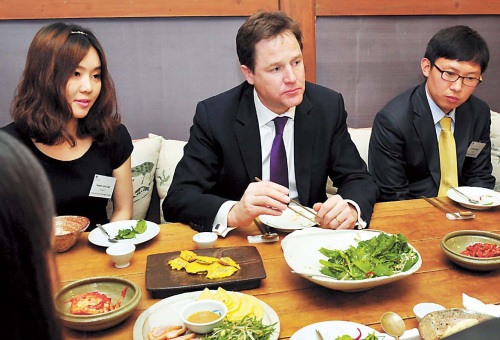British deputy leader moved by N. Korean defectors’ stories
By Korea HeraldPublished : April 1, 2012 - 20:16
British Deputy Prime Minister Nick Clegg may have dined with scores of world leaders at the Seoul Nuclear Security Summit last week, but the following evening he enjoyed a more remarkable meal with five young North Korean defectors.
Clegg said the dinner with North Korean students at a restaurant in Insa-dong was the most moving part of his trip.
“The most powerful memory for me will be the dinner with five young North Koreans who fled from North Korea through various routes to make their homes here in South Korea,” he said after Tuesday’s dinner at a Korean restaurant in Insa-dong.
“It was very, very moving speaking to them about the anguish they feel about having left their families behind ― fathers, mothers, brothers and sisters ― about the confusion that they are going through trying to forge a new identity.”
Clegg said the dinner with North Korean students at a restaurant in Insa-dong was the most moving part of his trip.
“The most powerful memory for me will be the dinner with five young North Koreans who fled from North Korea through various routes to make their homes here in South Korea,” he said after Tuesday’s dinner at a Korean restaurant in Insa-dong.
“It was very, very moving speaking to them about the anguish they feel about having left their families behind ― fathers, mothers, brothers and sisters ― about the confusion that they are going through trying to forge a new identity.”

Defector Lee Hyeon-seo, who attended the dinner, said “Even though he had a really tight schedule he made time to meet North Korean students and talk. I was impressed with his thoughtful, attentive consideration and kindness.”
Clegg discussed the defectors’ ambitions, with one girl hoping to work for the United Nations because of the help that it and UNICEF gave her in North Korea. Another said they wanted to be a lawyer to bring the rule of law to a future united Korean Peninsula. Another wanted to offer psychological support to people in his home country who had shared his trials and tribulations under Pyongyang’s communist regime.
“Another person said to me they wanted to be a politician, I tried to discourage her but I’m not sure if I succeeded,” Clegg joked in a speech following the meal.
Lee, who came to South Korea via China four years ago, said the British deputy leader also asked the defectors about their hometowns and how they came here from North Korea.
“He asked about the most difficult things about living in South Korea and if North Koreans’ starving is true as we hear from press, and if so how serious that is,” she added. “And he asked us about our expectations after Kim Jong-il’s death, the future for North Korea and our dreams in 10 years time.”
In return, she quizzed him about the U.K.’s role in promoting peace on the Korean Peninsula and improving human rights in North Korea. She also asked what the U.K. government could do to help North Korean refugees, and what his country could do to help them settle there.
“To me, it means the world has started to be curious about North Korean human rights,” added Lee, who is currently studying English and Chinese in Seoul, and also reports for the Unification Ministry. “Finally, I can see our reunification is not far-off.”
Clegg called the meal “an immensely moving and uplifting thing that should give a great deal of inspirational hope to all of us who hope and pray for a Korean Peninsula whole and peaceful and living in harmony in future.”
The deputy prime minister also said he hoped that China could encourage change in North Korea, but stopped short of calling for an end to the country’s practice of repatriating North Korean defectors that make their way over the border.
“We of course want to help South Korea develop the capacity to welcome and integrate North Korean defectors to South Korea,” he said.
“We realize that is a big challenge, but I think that we owe it to people who want to seek freedom to help them. China has an immense amount of influence over North Korea and I hope that in these matters, as in so many other matters, China will play a moderating role which will encourage a process of political and economic change in North Korea itself.”
Clegg spoke at an event at Standard Chartered Bank in Seoul to launch the GREAT Britain campaign in Korea.
The global campaign aims to promote U.K. culture, business, environment and sports to the world by capitalizing on interest in the country generated by the London 2012 Olympic and Paralympic Games. The campaign aims to attract 4.6 million extra visitors to the U.K. over the next four years.
By Kirsty Taylor (kirstyt@heraldcorp.com)
-
Articles by Korea Herald



![[Exclusive] Korean military set to ban iPhones over 'security' concerns](http://res.heraldm.com/phpwas/restmb_idxmake.php?idx=644&simg=/content/image/2024/04/23/20240423050599_0.jpg&u=20240423183955)

![[Graphic News] 77% of young Koreans still financially dependent](http://res.heraldm.com/phpwas/restmb_idxmake.php?idx=644&simg=/content/image/2024/04/22/20240422050762_0.gif&u=)



![[Pressure points] Leggings in public: Fashion statement or social faux pas?](http://res.heraldm.com/phpwas/restmb_idxmake.php?idx=644&simg=/content/image/2024/04/23/20240423050669_0.jpg&u=)










